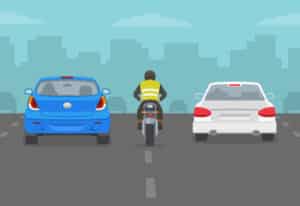Is Lane Splitting Legal in Colorado?
Key Takeaways:
Lane splitting remains illegal in Colorado, but a new three-year pilot law (SB24-079) makes lane filtering legal under strict conditions, including passing only when vehicles are fully stopped, staying under 15 mph, and maintaining a safe lane width. Research from UC Berkeley indicates that lane-splitting speeds above a 15-mph differential sharply increase crash risk, underscoring why Colorado limits filtering speed. Because lane splitting violates state law, riders who do it are typically assigned partial fault in a crash under Colorado’s comparative negligence rules, which can reduce or even bar compensation. Lane filtering carries less liability exposure, but improper filtering – such as passing on the right or filtering in unsafe conditions – can still lead to fault. Accurate documentation and legal guidance are essential when accidents occur during filtering or at intersections where right-of-way misunderstandings are common.
The smaller size of motorcycles compared with other vehicles makes it easier for them to maneuver through heavy sections of traffic. Many riders take advantage of this increased maneuverability by engaging in lane splitting, which allows them to pass through traffic much faster than if they simply stayed behind the vehicles in front of them.
According to a UC Berkley study, lane splitting is relatively safe when done in situations where traffic is moving under 50 mph and the motorcycle is traveling no more than 15 mph faster than the other vehicles on the road. However, the study found that when motorcycles are going more than 15 mph faster than the other vehicles on the road, lane splitting significantly increases the risk of a motorcycle accident.
If you ride a motorcycle in Colorado, it’s important to understand that lane splitting is illegal. However, a recent law has made a similar practice called lane filtering legal.
What Is the Difference Between Lane Splitting and Lane Filtering?
 Lane splitting involves riding your motorcycle between two lanes of moving vehicles. In most instances, motorcyclists will ride along the painted dividing line while lane splitting. This riding maneuver is most commonly used to navigate heavy traffic in order to get through the traffic jam faster.
Lane splitting involves riding your motorcycle between two lanes of moving vehicles. In most instances, motorcyclists will ride along the painted dividing line while lane splitting. This riding maneuver is most commonly used to navigate heavy traffic in order to get through the traffic jam faster.
Lane filtering involves riding your motorcycle past a stopped vehicle in the same lane. This riding maneuver is most commonly used at stoplights or in gridlocked traffic in an attempt to position your motorcycle near the front of the line and avoid getting sandwiched between two vehicles.
What Is Allowed Under the New Lane Filtering Law?
The lane filtering law (SB24-079) went into effect on August 7, 2024, and it will run through September 1, 2027. During this three-year trial period, the Colorado Department of Transportation will gather safety data to determine whether this law should be extended permanently.
In order to legally lane filter under the new law, you must adhere to the following criteria:
- The other vehicles in the lane must be stopped
- The lane is wide enough to pass safely
- The motorcycle cannot exceed 15 mph while passing other vehicles in the lane
- Road conditions must allow for the rider to pass safely and maintain control of the motorcycle
- The rider must pass on the left side of the vehicle and not enter the oncoming traffic lane
The law also states that the following lane filtering practices are illegal:
- Exceeding 15 mph when lane filtering
- Passing on the right shoulder
- Passing to the right of the vehicle in the farthest right-hand lane
- Filtering between lanes of traffic moving in opposite directions
How Does Lane Splitting and Lane Filtering Impact Liability in a Motorcycle Accident?
 Since lane splitting is illegal, you will be found at least partially liable in a motorcycle accident that occurs while you’re engaging in this practice. The other circumstances associated with the accident will determine exactly how much fault is attributed to your actions. Colorado is a comparative negligence state. This means that you can only recover compensation for your damages in a motorcycle accident if your percentage of fault is determined to be less than 50%, and your damages will be reduced by the percentage of fault attributed to your actions. This means lane splitting will negatively impact your ability to maximize the value of your compensation in a motorcycle accident claim and, in some instances, it may potentially prevent you from recovering damages at all.
Since lane splitting is illegal, you will be found at least partially liable in a motorcycle accident that occurs while you’re engaging in this practice. The other circumstances associated with the accident will determine exactly how much fault is attributed to your actions. Colorado is a comparative negligence state. This means that you can only recover compensation for your damages in a motorcycle accident if your percentage of fault is determined to be less than 50%, and your damages will be reduced by the percentage of fault attributed to your actions. This means lane splitting will negatively impact your ability to maximize the value of your compensation in a motorcycle accident claim and, in some instances, it may potentially prevent you from recovering damages at all.
Because lane filtering is legal under specific conditions, its impact on liability will be more situation dependent. As long as you comply with the rules established in the lane filtering law, this practice most likely won’t be factored into the determination of who is at fault for the accident. But if you lane filter improperly, such as by exceeding 15 mph, passing on the right or filtering in a lane that isn’t wide enough to pass safely, your actions may cause you to be held at least partially liable for the motorcycle accident.
Liability can be more complicated when the motorcycle accident occurs at an intersection or when re-entering traffic lanes after lane filtering. In these situations, misunderstandings between the vehicle driver and motorcyclist regarding right of way and timing of re-entry may lead to the accident. Clear documentation of the events of the accident will be critical in these situations to accurately determine who is at fault. Working with an experienced motorcycle accident lawyer will help you to properly establish that the other driver’s actions caused the crash.
Pushchak Law Can Help
If you’ve been injured in a motorcycle accident that occurred while lane filtering, it’s critical to have experienced legal representation. At Pushchak Law, we can help ensure your rights are protected throughout the process.
Brian Pushchak has made motorcycle accidents a primary focus of his practice. He understands the nuances of the new lane filtering law and how they impact liability in a motorcycle accident case. Mr. Pushchak can help you gather the proper evidence to demonstrate the other driver was at fault. This specialized expertise will give you the edge you need when seeking to maximize the value of your compensation.
When you work with Mr. Pushchak, you’ll benefit from his Informed Decisions™ Approach focused on helping you achieve the best possible outcome to your case. This unique approach to motorcycle accident lawsuits keeps you in control of your case at all times. Mr. Pushchak will discuss your goals for the case to ensure he understands your desired outcome. Then, he’ll answer any questions you have and explain your legal rights and options in detail. Your desired outcome will determine his recommendations regarding the best legal strategy to pursue, but you’ll always have final say regarding how your case is handled. This ensures Mr. Pushchak remains aligned with your goals at all times.
Contact us today to schedule a free consultation. Pushchak Law serves clients in Denver and the surrounding areas.
- Case Study: Denver Dog Bite Case with $750,000 Recovery - February 18, 2026
- How Not Wearing a Helmet Impacts Your Motorcycle Accident Case - January 21, 2026
- How to Get a Colorado Motorcycle License - January 20, 2026
Free Case Consultation
If you have been injured and would like to speak with one of our attorneys, take advantage of our free, no-obligation consultation. And if you have a viable case, there are no fees until we win.
Call 303.372.6145

